Archive for April, 2014
While the Coal River Valley may be better known for the mountaintop removal coal mining that has created health and economic issues there for years, there are a lot of exciting community development efforts that show the spirit of the community and the potential for positive change. The community successfully organized to build a new school in their community, when Marsh Fork Elementary was threatened by a sludge dam and nearby prep plant.
The Tadpole Project,��which is run by internationally known group Coal River Mountain Watch,ďż˝has been working with youth in the Coal River Valley for several years now. The group organizes clean-ups along the river, and have one planned for tomorrow, April 26th. ďż˝The long term goals are to work together as a community to address all the pollution in the Big Coal River and it’s tributaries.
Along the way, the project is getting kids out of the house, cleaning up the rivers and swimming holes, and teaching some lessons to parents as well.
“One of our kids said to his dad, ‘Daddy, don’t throw trash out the window of the truck or we’re going to have to pick that up later!'” said Peggy Bone, who works with the program through Coal River Mountain Watch. ďż˝”If you teach them when they’re young to not throw out trash, then they grow up knowing that.”
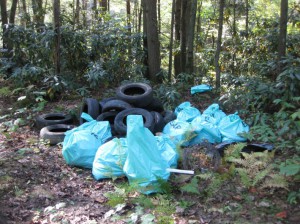 � � � � ��
� � � � ��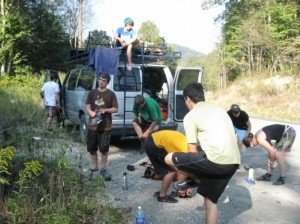
The Tadpole Project has adopted a stretch of highway in one of the most heavily strip-mined communities in Appalachia. This small but powerful effort showcases community pride and celebrates some of the greatest things about growing up in Appalachia.
“Our teenagers get excited about cleaning up our rivers, because that’s where they play.ďż˝Teenagers, including my son, are mainly interested in video games, he says so himself. It’s hard to get them outside and interested in picking up trash and volunteering on a Saturday. But they all want to help clean up their favorite swimming holes, because they all swim there,” added Bone.
The group has collected over 800 tires and provided community dumpsters to help people who don’t have access to bulk garbage clean-up.
ďż˝The Tadpole Project is developing youth leadership and direction through its youth advisory board. The group has leased a popular park in the area and have plans to create trails and fix it up for the entire community to enjoy. According to Bone, “A lot of groups doing similar work focus on teenagers, but we’re also working with even younger kids, who aren’t as influenced by the coal industry propaganda and have a lot of ideas about what they want to see in their community and in our park.”
The Tadpole Project works to protect and restore the Marsh Fork of the Big Coal River. �The 28-mile Marsh Fork tributary of the Big Coal River flows in the valley between Coal River Mountain and Cherry Pond Mountain in western Raleigh County.� The Marsh Fork, and the numerous creeks running into it, suffer from years of neglect and build-up of garbage and scrap metal. �Our goal is to foster community pride by getting community members involved in the restoration of our river and bringing awareness to the natural beauty of our area. �We are organizing clean-up days along the river and its creeks, going door-to-door talking to people who live along the river, and engaging local high school students to help with the clean up.
Ultimately, the Tadpole Project hopes to expand to involve the community in other aspects of watershed protection. �Coal mines, coal processing plants, mountaintop removal sites, gas wells, timbering, and personal waste waters all affect the health of our waterway.� These concerns all need to be addressed in order to have a healthy Marsh Fork watershed. � Our goal is to map out a watershed plan which would address all the sources and causes of stream impairment in the Marsh Fork tributary and to engage local residents in stream monitoring and water testing to involve them in protecting the health of our river.
No comments yet » Leave your own...
Members of Southern Appalachia Mountain Stewards (SAMS) recently hosted an exciting workshop, Wise County Apple Day, about the potential for bringing back the once thriving apple orchard economy in Wise County, VA. The workshop was part of a new effort called AppalCEED (Appalachia Communities Encouraging Economic Diversification)
Wise County, Virginia, was the nation’s top producer of apples until surface coal mining destroyed the majority of the orchards. AppalCEED organizers are looking to rebuild this industry. The workshop brought together heirloom apple growers to give demonstrations on apple grafting and growing, and have out free root stock for participants to take home and plant themselves.
Long time Appalachian activist Helen Lewis (find her great books at the Highlander Center) spoke about the history of apples in Wise County and her long work in the apple economy in the area, which she began in 1955.
According to Lewis, many of Wise Counties orchards were lost to strip mining, but she has hopes that reclamation projects can create apple orchards, as well as local wineries, and other economic development in the area.
Local growers were realistic about the challenges to growing in the area – threats include bears, deer as well as a lack of trained workers and out of date policies that don’t protect growers.
However, members of SAMS are excited about growing the potential for apples in Wise County – starting with the delicious apple crisp with ice cream they enjoyed at the meeting.
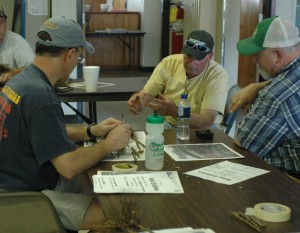
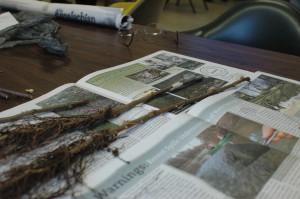
No comments yet » Leave your own...
Earlier this month, citizens from Appalachia joined with the Citizens Coal Council and leaders from coal-impacted regions across the country for an unprecedented meeting with the Secretary of the Interior, Sally Jewell, in Washington, DC.
Community members made the journey because this year, Secretary Jewell will make major decisions that impact the water and future of Central Appalachia. This important meeting is just one step in our work to ensure that Appalachians have a seat at the table during this critical time.
You can help. Support our work to protect our water and our future.
Over 1.2 million acres – 10% of Central Appalachia – have been surface mined for coal. Lackluster enforcement and rampant mining pollution have deprived Appalachian communities of the clean water that most Americans take for granted.
It’s a critical time for Appalachian communities. Your support is key to ensuring important protections are made and that we have the funds to ramp up for the Our Water, Our Future Action thisSeptember 8th and 9th in Washington, DC.
You can support this work by donating to the Our Water, Our Future effort, our grassroots campaign to get real federal enforcement to protect mountain communities from the ravages of the coal industry.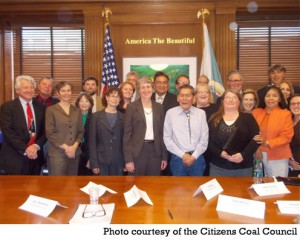
No comments yet » Leave your own...
The Fossil Fuel Student Divestment Network has spread to over 500 campuses internationally. These students and alumni are working to get their universities and colleges to divest from fossil fuels. A recent victory at Harvard University shows the power of the movement – just six months ago, Harvard officials had told students and alumni there was no way the school would divest their $33bn endowment from fossil fuels. However, Harvard is the 9th college so far to show movement in the direction of divestment by setting aside a fund to reinvest. Pitzer University recently won the most comprehensive divestment victory yet.
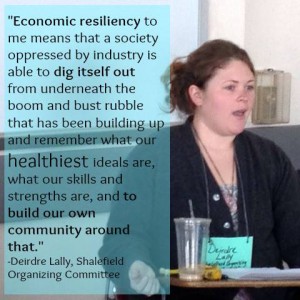
Photo by Fossil Fuel Divestment Student Network
Recently, organizers hosted a convergence, gathering 300 students from dozens of universities in San Francisco along with leaders from across the environmental justice and climate change movements to learn new skills and make plans.
Paul Corbit Brown from the Keeper of the Mountains Foundation and Christine Gyovai spoke to the impacts of coal on communities in Appalachia, as well as the powerful work for economic resiliency that they are a part of in Central Appalachia.
“I discussed how to support projects where community members are developing local economies, especially in Southwest Virginia,” said Christine Gyovai. “We are looking at how to sustain this project over the long haul – how do we translate our ideas and visions into concrete, sustainable action. It was great to see ways that other communities are doing this work. It’s important to have a place to come together and hear people’s stories.”
“I appreciated all the different people’s perspectives gathered at the convergence – different perspectives with a unified theme. It was inspirational, but also hands on with concrete ideas and tools to bring back home.”
As students look to divest from fossil fuels, it’s important to explore what reinvestment in the communities most impacted by fossil fuels can look like. To hear interviews with some of the students who organized the convergence, check out this article. Go here to sign a petition calling for divestment of fossil fuels and to find out about local campaigns in your area.
No comments yet » Leave your own...
Thanks to Dan Taylor with OVEC for this great write up of the recent Appalachian Studies Association Conference in Huntington, WV. Read on for an update about the conference and the important work:
It was great to have the Appalachian Studies Association conference back at Marshall University in Huntington, West Virginia, where I live. I had a great weekend, meeting lots of interesting new people and hearing lots of interesting new ideas. The best thing about this conference is always the variety, as many disciplines and fields touch on the “Appalachian” experience. You can hear great academic lectures, talks on activism, music and art; it runs the whole gamut of cultural experience in an overloaded weekend.
A highlight was watching my co-workers here at OVEC, who is also based in Huntington, present on Cemetery Preservation issues, as it related to mountain top removal coal mining and gas extraction that threatens our states’ history. This session included Boone County residents and activists Maria Gunoe, Dustin White and Danny Cook, currently working on access issues with the Cook family cemetery, and OVEC organizer Robin Blakeman, who has dealt with these issues in the past.
There were also great sessions on Appalachian labor history, economic transition in Wales after coal mining left the region, prison expansion in Central Appalachia and the Highlander Center’s new Appalachian Transition Fellowship Program. This fellowship is a particularly interesting and fantastic opportunity to build capacity for economic transition in our region. The Alliance for Appalachia and OVEC have recently been accepted as hosts for fellows. I very much look forward to working with the fellows and seeing the great projects that they can accomplish in the next year.
The Alliance for Appalachia hosted sessions on the work of the economic transition team. We had a great crowd, great discussion and enthusiasm for our past work and our work moving forward to create a better and more just economy for our region.
Participating in events like the Appalachian Studies Association is just one way that communities are building the regional conversation for a just transition for a cleaner, brighter Appalachian future. Topics discussed at the panel hosted by The Alliance for Appalachian included the need for land reform, energy efficiency initiatives, and tax reform. Events like these are an exciting way for those working on these important issues to share information and keep moving the region forward. Stay tuned for more updates as this exciting work grows.
No comments yet » Leave your own...
Exciting Update from our friends at Gainesville Loves Mountains!
It’s been 3+ years since Gainesville Loves Mountains first started our campaign to end GRU’s purchases of mountaintop removal coal.
This powerful campaign has finally reached its conclusion. We can win this victory with your support.
On April 17th, Gainesville City Commissioner Lauren Poe will direct City staff to take the initial steps to formally end GRU’s relationship with strip-mined coal from Appalachia. You can read more details on our website, but here’s how you can help us win:
*Please share this petition with everyone you know and ask them to sign on before April 17th.
*We also need Gainesville residents, as well as Appalachians living in the shadow of MTR, to contact our City Commission personally and let them know that you support our campaign. Even a brief personal phone call, letter, or email with the simple message “I want GRU to bring a permanent end to their consumption of strip-mined Appalachian coal” goes a long way.
*And finally, if you live in the Gainesville area, please help spread the word about the April 17th City Commission meeting on Facebook. You can also help us outreach for the April 17th meeting through phone-banking and canvassing at public events. If you have even one hour of time between now and the 17th and would be willing to help get out and spread the word, please contact us (gainesvillelovesmountains@gmail.com) and we’ll put you to work!
Thanks so much for your support. With your help we can win a victory for the mountains and set an example for coal-consuming communities everywhere.
1 Comment » Leave your own...















